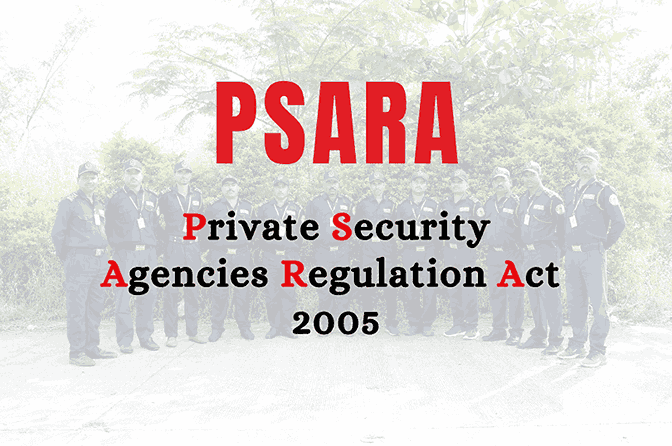Understanding the PSARA Act, 2005: A Certified License for Private Security Agencies
The Private Security Agencies Regulation Act (PSARA), 2005, is a landmark legislation in India that governs the functioning of private security agencies (PSAs). These agencies provide trained private security guards to organizations and individuals, ensuring safety and protection in a world increasingly dependent on private security services.
In this blog, we’ll explore the key aspects of the PSARA Act, its significance, and how it impacts private security agencies in India.

What is the PSARA Act, 2005?
The PSARA Act, 2005, was enacted to regulate private security agencies operating across India. Its primary goal is to ensure that these agencies function within a legal framework, maintain high standards of service, and safeguard the interests of both clients and employees.
This Act mandates that private security agencies must obtain a PSARA license to operate legally. The license acts as a certification that the agency complies with the required rules and regulations, ensuring trustworthiness and accountability.
Key Features of the PSARA Act
1.Mandatory Licensing:
Every private security agency in India must acquire a PSARA license. Without it, they cannot legally provide security services
2.Eligibility Criteria:
To obtain the license, agencies and their promoters must meet specific eligibility criteria, including:
- Indian citizenship
- Clean criminal record
- Adequate financial resources to run the business
3.Training Requirements:
The Act emphasizes the need for professional training of private security guards. Guards must be well-trained in areas like physical fitness, first aid, crisis management, and crowd control.
4.Compliance and Background Checks:
Agencies are required to conduct thorough background checks on their employees to ensure safety and reliability.
5.Regulatory Oversight:
The Act empowers state governments to regulate and monitor the functioning of private security agencies within their jurisdiction.
Significance of the PSARA Act
1.Ensures Professionalism:
By mandating training and adherence to specific standards, the Act ensures that security services provided are professional and effective.
2.Protects Clients and Guards:
Clients are assured of hiring services from licensed and credible agencies, while guards benefit from structured employment and training opportunities.
3.Legal Framework:
It provides a legal framework that protects the rights of all stakeholders and minimizes the risk of unregulated operations.
Impact on Organizations and Businesses
Organizations that hire private security guards from PSARA-certified agencies benefit significantly from the Act. They receive services from well-trained professionals who operate within a regulated framework. This not only ensures safety but also fosters trust and reliability in the relationship between businesses and security providers.
Conclusion
The PSARA Act, 2005, has brought much-needed structure and professionalism to the private security sector in India. For organizations, hiring security services from PSARA-licensed agencies is a step towards ensuring safety and compliance.
If you’re considering hiring private security guards, always check for PSARA certification to ensure you’re dealing with a legitimate and trustworthy agency. By adhering to the guidelines set forth in the Act, private security agencies can contribute significantly to creating a safe and secure environment for everyone.

